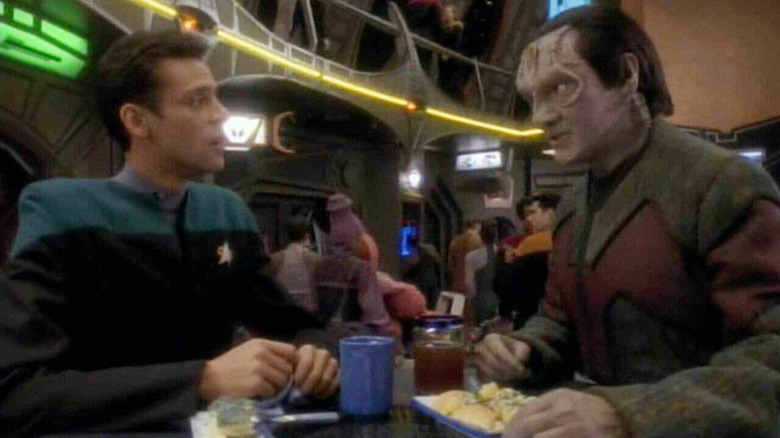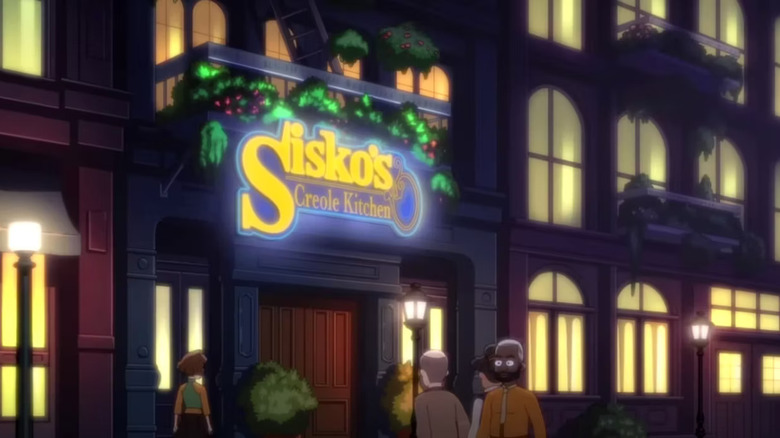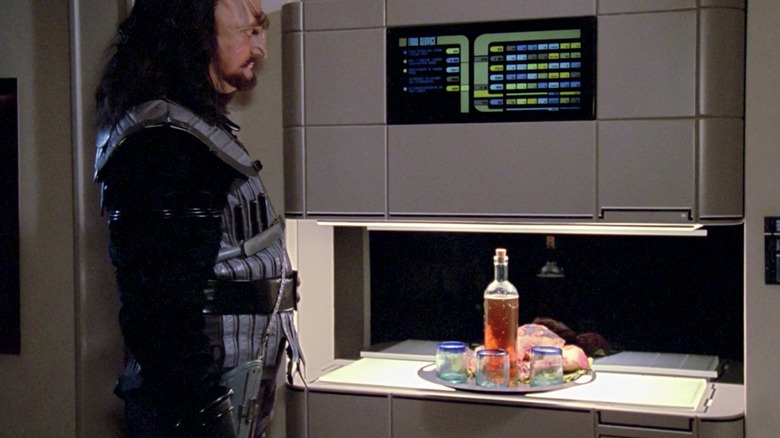Why Star Trek's Replicators Outraged Some Of The Series' Biggest Writers
"Star Trek" was initially meant to be a portrait of a technological utopia set in a future when humanity had outgrown war, shed religion, and put money behind it. In the best of cases, the franchise revealed a world without want or starvation, having become so well-organized that resources could be freely shunted about the galaxy on miraculous faster-than-light starships. Most notably, starting with "Star Trek: The Next Generation," Federation vessels were equipped with magical food replicators, which rearranged energy into edible matter. One could walk up to a food slot on the wall — everyone's personal quarters had one — and order anything from a glass of water to a six-course meal. Famously, Captain Picard (Patrick Stewart) would order "Tea. Earl Grey. Hot."
Replicators are such a miraculous technology, that the writers of "Star Trek" had to begin inventing limitations merely for dramatic reasons. It's now been established repeatedly throughout "Star Trek" that replicated food ... isn't that good. Replicators can create a meal, but it will taste a little bland and synthetic. Also, booze is not available through replicators, which may be wise aboard a starship.
This meant the real-life chefs and winemakers of the future have become comfortably smug. There are still restaurants in the 24th century, and certain cooking traditions have persisted. Replicators have eliminated want, but fresh ingredients are still valued for their taste and quality.
In Terry J. Erdmann's and Paula M. Block's invaluable sourcebook "Star Trek: Deep Space Nine Companion," showrunner Ira Steven Behr is quoted as to how much he hated replicators as a concept, and how he tried to write around them as often as possible.
The value of handmade meals in Star Trek
It was established in the early days of "Deep Space Nine" that Commander Sisko (Avery Brooks) was the son of a Creole chef, Joseph Sisko (Brock Peters). It had also been mentioned in several previous episodes of "Star Trek: The Next Generation" that people still went to diners and bistros when not onboard the Enterprise. This indicated that the dining experience was still cherished and that going out to eat remained a ritual. With the Siskos, it was further cemented that many Starfleet officers keep ingredients on hand to cook food in their rooms. Not everyone, it seems, has to rely on the convenience of food replicators.
"I'd like to lose the replicators.," Behr admitted. "[...] They're my least favorite thing in 'Star Trek.' A society that uses replicators is a doomed, finished society." Behr didn't elucidate as to why, perhaps feeling that it would turn food into a utility rather than a source of pleasure and nourishment. Writer Hans Beimler posited that Sisko's cooking skills were indicative of the importance of hobbies in the future. Cooking, Beimler noted, is a social exercise, something you do to nourish others. That, he felt, reflected positively on Sisko's character. He was the type of person to take pride in his work, therapeutically devote himself to something other than being a station commander, and take care of his son and his friends with a spicy meal.
Behr and Beimler weren't the only ones who liked handmade meals over replicators. Executive producer and longtime "Star Trek" head honcho Ronald D. Moore even spoke out against the frustrating convenience of replicators in the book "The Science of Star Trek: The Scientific Facts Behind the Voyages in Space and Time" by Mark Brake.
'Replicators are the worst thing ever'
Moore was concerned that replicators robbed writers of their ability to write drama. If there is no want, and every object can be replaced out of thin air, Moore reasoned, then nothing can be written as a singular, valuable MacGuffin:
"Replicators are the worst thing ever. Destroys storytelling all the time. They mean there's no value to anything. Nothing has value in the Universe if you can just replicate everything, so all that goes away. Nothing is unique; if you break something, you can just make another one. If something breaks on the ship, it's 'Oh, no big deal, Geordi can just go down to engineering and make another doozywhatsit.' Or they go to a planet and that planet needed something: 'Oh, hey, let's make them what they need!' We just hated it and tried to forget about it as much as possible."
(Geordi is, of course, the chief engineer of the Enterprise on "Next Generation," as played by LeVar Burton.)
Moore, mind you, is missing a central tenet of "Star Trek." The fact that Geordi can make another "doozywhatsit" is part of the utopia he lives in. If a planet needs a lot of something, the Enterprise can indeed manufacture it out of thin air.
This convenience may be why replicators have additional limitations: it's not interesting for viewers if a replicator can take care of every problem. Replicators use up a lot of energy, for one, so it's not practical to use it as a mass manufacturing tool. Also, one can't replicate large objects; it would be dramatically unsatisfying to replicate an entire starship, for instance. Moore and Behr, concerned with story writing, hate replicators.
But the world would definitely be better with them.


